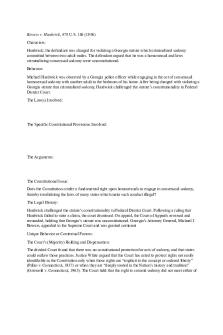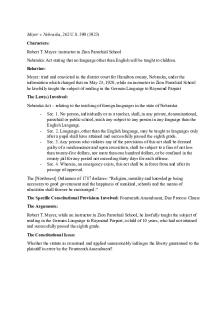Lochner v NY CB - Lecture notes case brief PDF

| Title | Lochner v NY CB - Lecture notes case brief |
|---|---|
| Author | Jozie Lowe |
| Course | Constit Law I/Institutnl Power |
| Institution | University of The Incarnate Word |
| Pages | 2 |
| File Size | 88.7 KB |
| File Type | |
| Total Downloads | 72 |
| Total Views | 154 |
Summary
professor metroka...
Description
Lochner v. New York, 198 U.S. 45 (1905) Characters: Joseph Lochner, a baker from Utica, New York New York Behavior: In response to public concern over unsafe and unsanitary bakeries, the state of New York enacted the Bake Shop Act of 1897. The law required that all commercial bakeries meet standards for drainage and plumbing, restrooms, fire safety, and sanitation. One part of the law favored by organized labor set maximum hours of work for bakery employees: “No employee shall be required or permitted to work in a biscuit, bread, or cake bakery or confectionary establishment more than sixty-hours in any one week, and more than ten hours in any day. Joseph Lochner was prosecuted for making an employee work more than sixty-hours in a week. The Law(s) Involved: The Bake Shop Act of 1987, Allgeyer v. Louisiana (1897), Holden v. Hardy, 169, U.S. 366 (1898), The Specific Constitutional Provision Involved: 14th Amendment (p.251) – “The general right to make a contract in relation to his business is part of the liberty of the individual protected by the 14 th Amendment of the Federal Constitution”, The Arguments: In 1896, the New York legislature enacted the Bakershop Act which limited the hours bakers were permitted to work to no more than ten per day. Joseph Lochner (defendant) owned a bakery in New York (plaintiff) and was fined twice under the law for overworking an employee. His conviction was upheld in the Appellate Division of the New York Supreme Court, and was affirmed in the New York Court of Appeals. The Constitutional Issue: Does the New York law violate the liberty protected by due process of the Fourteenth Amendment? Does the due process clause of the Fifth Amendment and Fourteenth Amendment protect liberty of contract and private property against unwarranted government interference? The Legal History: Joseph Lochner, a baker from Utica, New York, was prosecuted in 1901 for making an employee work more than sixty hour in a week. He was convicted in a state trial court and fined $50. The intermediate court of appeals upheld the conviction on a 3-2 vote, and New York’s highest court affirmed on a 4-3 vote. The US Supreme Court granted review. Unique Behavior or Contextual Factors: The Court’s (Majority) Holding and Dispensation: This law is an abridgement to the liberty of contract and a violation of due process. The general right to make a contract in relation to his business is part of the “liberty” of the individual protected by the 14 th Amendment. No state can deprive any person of life, liberty or property without due process of law. The right to purchase or sell labor is part of that liberty protected. The only way a state may counter this right is to show they are exercising a valid police power with their regulation. Those powers relate to the safety, health, morals, and general welfare of the public. The Court rejected the labor law justification of the statute on police power grounds because this was not a valid exercise of police powers. First, the power is extended to the protection of “public welfare” and not the readjustment of bargaining power between employees and employers. The effect of this legislation was to regulate labor conditions and not to protect workers. The effect of such statutes, not just the stated or proclaimed purpose, is determinative in whether this statute is repugnant to the United States Constitution.
Second, there is no valid health of safety rationale in this case. Bakers were not endangered like miners were in the Holden v. Hardy case. Mining is a profession that needed regulation, but this is not. The state could accomplish its goals with means that did not interfere with the freedom to contract. Because the police power exercised here is not strong, the Court suspected that there were legislative motives behind the enactment of this law. New York was using its power to upset the free market. The Court’s Expressed Reasoning (The Majority Opinion):
Concurring and Dissenting Opinions: Justices Holmes, Harlan, White and Day dissenting. J. Holmes: States may regulate life in many ways which might seem injudicious or tyrannical and which may interfere with the liberty to contract. Sunday laws and usury laws are examples. Liberty of a citizen to do as he likes so long as he does not interfere with the liberty of others to do the same, has been interfered with by school laws, the Post Office, every state or city which takes his money in taxes for purposes thought desirable which he may or may not like. The states have interfered with the liberty to contract with the prohibition of sales of stock on margins for future delivery and the eight-hour law for miners. A Constitution is not intended to embody a particular economic theory. Finding certain opinions natural and familiar or novel ought not to determine whether the statutes conflict with the Constitution. The word “liberty” in the 14th Amendment is improperly construed when it is held to prevent natural outcome of a dominant opinion, unless it can be said that a rational and fair man necessarily would admit that the statute proposed would infringe fundamental traditions, which have been understood by the traditions of our people and law. J Harlan: If a state is to interfere with the right to contract, it may do so only if the regulation involves a state’s police power to protect the health of its citizens. The Court should not be concerned with the policy of legislation. The only question is whether the means devised by the state are germane to a valid end. Personal Notes:...
Similar Free PDFs

Full CB lecture notes
- 52 Pages

Lubitz v Wells Case Brief Notes
- 2 Pages

Wesson v. Walmart - case brief
- 2 Pages

Morse v Frederick Case Brief
- 2 Pages

Graham v Connor - Case Brief
- 1 Pages
Popular Institutions
- Tinajero National High School - Annex
- Politeknik Caltex Riau
- Yokohama City University
- SGT University
- University of Al-Qadisiyah
- Divine Word College of Vigan
- Techniek College Rotterdam
- Universidade de Santiago
- Universiti Teknologi MARA Cawangan Johor Kampus Pasir Gudang
- Poltekkes Kemenkes Yogyakarta
- Baguio City National High School
- Colegio san marcos
- preparatoria uno
- Centro de Bachillerato Tecnológico Industrial y de Servicios No. 107
- Dalian Maritime University
- Quang Trung Secondary School
- Colegio Tecnológico en Informática
- Corporación Regional de Educación Superior
- Grupo CEDVA
- Dar Al Uloom University
- Centro de Estudios Preuniversitarios de la Universidad Nacional de Ingeniería
- 上智大学
- Aakash International School, Nuna Majara
- San Felipe Neri Catholic School
- Kang Chiao International School - New Taipei City
- Misamis Occidental National High School
- Institución Educativa Escuela Normal Juan Ladrilleros
- Kolehiyo ng Pantukan
- Batanes State College
- Instituto Continental
- Sekolah Menengah Kejuruan Kesehatan Kaltara (Tarakan)
- Colegio de La Inmaculada Concepcion - Cebu










